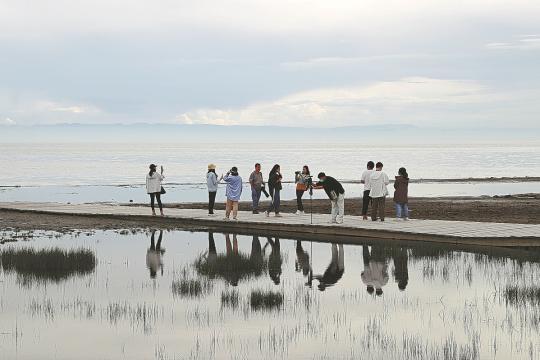Protection of Qinghai-Tibet Plateau urged

Visitors take photos near the north shore of Qinghai Lake in Gangca county, Qinghai province, on Aug 11. (WANG ZHUANGFEI/CHINA DAILY)
Chinese lawmakers have started deliberating a draft law dedicated to conserving the ecosystem of the Qinghai-Tibet Plateau, considering the "unique" and "irreplaceable "role of the region for ecological security for both China and the rest of the world.
In addition to measures on ecological conservation and remediation, efforts to cope with hazards triggered by climate change are among the key concerns of the draft law, which was submitted to the Standing Committee of the National People's Congress for the first reading on Tuesday.
The conditions of the plateau's ecosystem exert direct impacts on biodiversity, water supply, the stability of the climate system and the balance between carbon emissions and absorption in the country, said an explanatory document on the draft law released by the committee. The full text of the draft law has not yet been made public.
China's government has attached great importance to ecological conservation in the Qinghai-Tibet Plateau in recent years.
As of 2021, the country has established 397 national parks and natural reserves and parks there, covering 35.3 percent of the plateau, Cheng Lifeng, a member of the NPC Standing Committee, said in a group discussion of the draft law on Wednesday.
Stretching for 2.58 million square kilometers, the Qinghai-Tibet Plateau covers not only the Tibet autonomous region and Qinghai province, but also parts of the Xinjiang Uygur autonomous region and Sichuan, Gansu and Yunnan provinces. The plateau is the origin of some of the longest rivers in the world, including the Yangtze and the Yellow rivers.
Given the importance and challenges faced by its environment, it is necessary to enact a law at the national level to beef up conservation and control of ecological risks, the committee said.
"With grassland degradation remaining severe and glacier degradation getting aggravated, the plateau has seen great hazards from water and soil loss and desertification of land, and its biodiversity is under threat," it said.
The document also highlights increasing extreme climate events in the region as the threat of climate change looms larger around the world, saying these events posed risks of secondary disasters.
In moves to address the ecological risks, the draft proposes the establishment of highly efficient systems to cope with and adapt to climate change, as well as to prevent and mitigate disasters.
Among the specific measures undertaken are monitoring and providing early warning for climate change and natural disasters, bans on entering key glaciers and protecting permafrost.
It also includes clauses on ecological impact monitoring for major development projects, germ plasm resources conservation and management, as well as the control of invasive alien species.
Identifying ecological conservation as a basic premise of the development of the plateau, the draft stressed the integrated conservation and restoration of mountains, rivers, forests, farmland, lakes, grasslands, deserts and glaciers, while letting nature restore itself as a major principle.
It also stipulates fiscal, tax and financial support for the ecological conservation of the plateau and encourages private funds to participate in the endeavor.
Li Zhanshu, a member of the Standing Committee of the Political Bureau of the Communist Party of China Central Committee and chairman of the NPC Standing Committee, has participated in at least two symposiums on the draft law so far this year.
